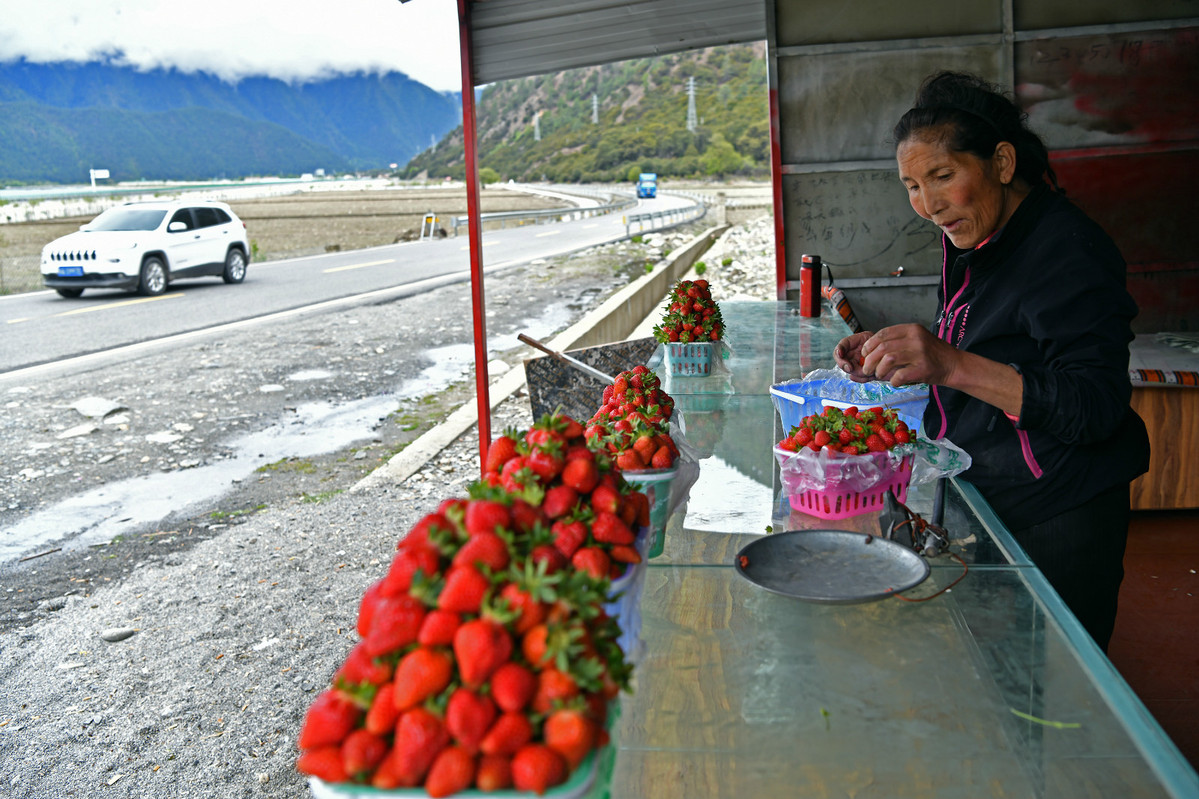Strawberries are a sweet business on roof of the world


LHASA - About 30 kilometers west of Nyingchi, a city in the Tibet autonomous region, is a strawberry greenhouse base. From the field to the shelf, it only takes half an hour for the fresh and perfect-looking strawberries to enter the homes of those who live on the roof of the world.
"It would all be impossible without the Sichuan-Tibet highway," said Dobrgyal, Party chief of Jiuba village.
Early in the morning, Yangzom, 39, entered her greenhouse and began picking strawberries. Then she took a bus to sell them in the nearby city market.
She sold all her strawberries - 15 baskets weighing a total 70 kilograms - in just a few hours, making over 2,000 yuan ($290).
"You have to work almost all day, except at noon when the sun is out, and the temperature is too high in the greenhouse," she said. "But compared with highland barley, I earn much more from selling strawberries."
Last year, her two greenhouses brought the family nearly 80,000 yuan.
The villagers used to make a living by cutting lumber and picking matsutake. Tibet banned logging of natural forests in 2002, which cut into the major source of income for the 120 villagers in Jiuba.
Dobrgyal said the village was so poor that young people didn't want to stay. There wasn't even a proper meeting room or a cement road in the village. Cow and pig feces were everywhere, so stinky that no females wanted to marry the men there.
In 2006, a methane tank was built in the village. With the help of the local agricultural bureau, a 20-square-meter greenhouse was erected on top of the tank. Villagers bought vegetable seeds and were surprised to find that turnips and cabbages were easy to grow. Hugely encouraged, they built greenhouses on other idle land covering more than 1,100 sq m.
The strawberries, white gourds, cabbages and corn harvested in the greenhouses sold for over 8,300 yuan, 10 times more than the highland barley they used to grow. Strawberries were especially lucrative.
A cooperative was set up soon after, which attracted over 60 villagers from 16 poverty-stricken households. In 2010, every household in Jiuba had a greenhouse, which brought an additional income of 30,000 yuan a year. In 2011, the per capita net income of the village exceeded 10,000 yuan.
Jiuba village has taken on a completely different look, with rows of Tibetan-style villas and all kinds of infrastructure including a villagers' service hall, a square, a library, a basketball court and a clinic.
Dobrgyal said he planned to expand the market for their strawberries and further increase villagers' incomes.
XINHUA
Today's Top News
- Xi extends condolences over plane crash in South Korea
- China stresses the Middle East needs to be free of external interference
- Probe into industry's beef with imports justified
- Xi sends condolences to South Korean acting president over plane crash
- PLA conducts combat patrols near Huangyan Island
- Shanghai to continue with property tax measures






























